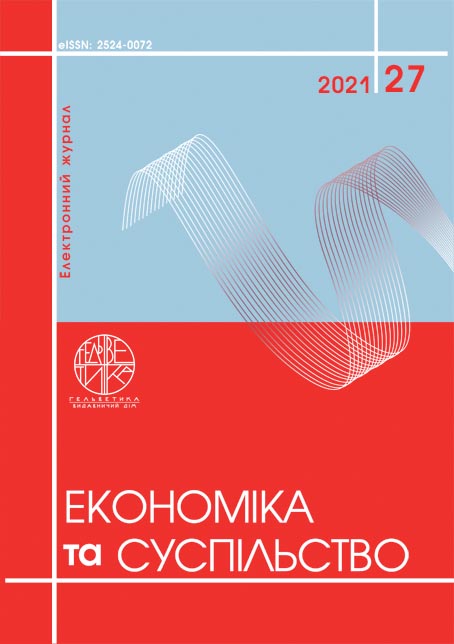INTELLECTUAL ECONOMY PARADIGM
Abstract
The purpose of formulating the concept of intellectual economy is the need to systematize and integrate the existing scientific heritage in order to identify and explain the patterns of economic agents functioning in new technical and industrial conditions at the final stage of transformational transitions which are the result of the fourth scientific and technological revolution. The categorical-conceptual construct "intellectual economy" is not widely used today and is mainly associated, affiliated or identified with some of the following: "knowledge economy"; "creative economy"; "information economy"; "innovative economy"; and, interestingly, "sustainable development". It was determined that the cycles of technological development and long waves are in causation and dialectical development: each technological cycle is the cause of the beginning of a new economic, and vice versa – each downward wave of the economic cycle mediates the upward wave of technological. That is, each deep protracted crisis in the economy encourages innovation, the proliferation of which, in turn, leads to the technological transformation of productive forces – the progress of the technological paradigm, which in turn causes economic recovery. It is worth emphasizing that the basis of technological transformation is always an intellectual transformation – first of human consciousness, and finally – of technology. Hence, we can conclude that today, at the end of the fifth long wave, we are simultaneously in the process of transition to the sixth technological order – a neo-industrial, the prerequisites for the transformation of the economic system in which are: incremental entropy of technology in all areas human life; completion of the fourth industrial (information) revolution; globalization; intellectual and technological transformation of productive forces, exchange and money circulation; transformation of economic agents and patterns of their interaction, etc. Thus, the assumption of the emergence of a new economic system acquires signs of validity and it can be argued that humanity is on the threshold of a neo-industrial economic system – the intellectual economy. We believe that the intellectual economy is an economic system, the main value-forming productive factor of which is intellectual capital. At the same time, the creative economy and the knowledge economy are components of the intellectual, as they are the result of the implementation of appropriate forms of intellectual capital, and the digital economy, transforming post-industrial society, became the objective basis for the neo-industrial era.
References
Schlicht, E. (1992). Marshall, keynes, and macroeconomics. Quaderni Di Storia Dell'economia Politica, 10(1), 511–529. Retrieved May 10, 2021, from: http://www.jstor.org/stable/43317529
Бутнік-Сіверський О.Б. Інноватика та інтелектуальна економіка (теоретико-методологічний аспект). 2007.
Orlovska, Y., Cherchata, A., & Kovalenko, O. (2020). Development of Intellectual Economy: Some Approaches For Policy Elaborating. Baltic Journal of Economic Studies, 6(2), 116–124. doi: https://doi.org/10.30525/2256-0742/2020-6-2-116-124
Шарапов О.Д., Степаненко О.П. Нова парадигма освіти в інтелектуальній економіці. 2012.
Harris, R. G. (2001). The knowledge‐based economy: intellectual origins and new economic perspectives. International journal of management reviews, 3(1), 21–40.
Kuhn, T. S. (2012). The structure of scientific revolutions. University of Chicago press.
Toffler, A., & Toffler, H. (1995). Creating a new civilization: The politics of the third wave. Turner Pub.
Šmihula, Daniel (2011): Long waves of technological innovations, Studia politica Slovaca, 2/2011, Bratislava, ISSN 1337-8163, pp. 50–69.
Василенко В. Технологические уклады в контексте стремления экономических систем к идеальности. Соціально-економічні проблеми і держава. 2013. № 1. С. 65–72.
Кондратьев Н.Д., Опарин Д.И. Большие циклы конъюнктуры. Вопросы конъюнктуры. 1925. № 1(1). С. 28–79.
Schumpeter J.A. Teorie der wirtschaftlichen Entwicklung. Berlin: Dunker&Humblot, 1997. S. 88–110.
Toffler A. Future shock, 1970. Sydney. Pan.
Єрешко Ю.О. Економічна теорія інтелектуального капіталу: інтелектуальна теорія вартості. Економіка і управління. 2016. № 4. С. 5–9.
Schlicht, E. (1992). Marshall, keynes, and macroeconomics. Quaderni Di Storia Dell'economia Politica, 10(1), 511–529. Retrieved May 10, 2021, from: http://www.jstor.org/stable/43317529
Butnik-Siverskyi, O. B. (2007). Innovatyka ta intelectualna ekonomika (teoretyko-metodolohichnyi aspekt).
Orlovska, Y., Cherchata, A., & Kovalenko, O. (2020). Development of Intellectual Economy: Some Approaches For Policy Elaborating. Baltic Journal of Economic Studies, 6(2), 116–124. doi: https://doi.org/10.30525/2256-0742/2020-6-2-116-124
Sharapov, О. D., & Stepanenko, О. P. (2012). Nova paradyhma osvity v intelektualnij ekonomici.
Harris, R. G. (2001). The knowledge‐based economy: intellectual origins and new economic perspectives. International journal of management reviews, 3(1), 21–40.
Kuhn, T. S. (2012). The structure of scientific revolutions. University of Chicago press.
Toffler, A., & Toffler, H. (1995). Creating a new civilization: The politics of the third wave. Turner Pub.
Šmihula, Daniel (2011): Long waves of technological innovations, Studia politica Slovaca, 2/2011, Bratislava, ISSN 1337-8163, pp. 50–69.
Vasylenko, V. (2013). Tehnologicheskie uklady v kontekste stremlenija ekonomicheskih sistem k idealnisti. Sotsialno-ekonomichni problemy і derzhava, 1, 65–72.
Kondratyev. N. D. & Oparin. D. I. (1925). Bolshiye tsikly konyunktury. Voprosy konyunktury, 1(1), 28–79.
Schumpeter J.A. Teorie der wirtschaftlichen Entwicklung. Berlin: Dunker&Humblot, 1997. S. 88–110.
Toffler, A. (1970). Future shock, 1970. Sydney. Pan.
Yereshko, Yu. О. (2016). Ekonomichna teoria intelektualnoho капіталу: intelektualna teoria vartosti. Ekonomika i upravlinnia, 4, 5–9.


